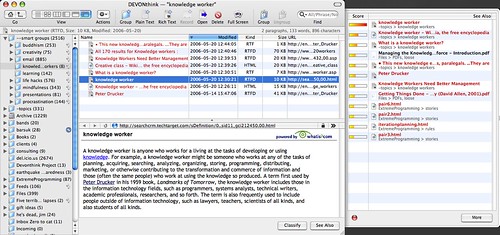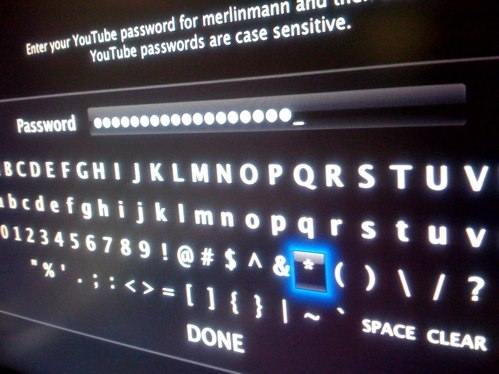Merlin’s weekly podcast with Dan Benjamin. We talk about creativity, independence, and making things you love.
Our Most Popular PostsMotivate yourself with "loss aversion"Merlin Mann | Mar 6 2008NPR: Put Your Money Where Your Girth Is I really enjoyed this Morning Edition story on "Prospect Theory," or the idea that loss aversion can be an effective motivator in goals related to health improvement like weight loss and smoking cessation:
Related to that question I was asked at Macworld: I wonder if a gym membership might be even more motivating if you received a daily email updating you on the wasted dollars you'd spent by not working out in the last n days. When I started paying most of my own college tuition, I remember realizing that every class I skipped was equivalent to throwing away about a day and a half of the money I'd earned from waiting on tables. It was very motivating for me, and I started missing a lot fewer classes as a result. read more »11 Comments
POSTED IN:
Field Reports: Guerrilla Office TacticsMerlin Mann | Oct 1 2007I've started collecting stories -- some of which may be entirely apocryphal tall tales -- of the purported lengths to which people are going to filter noise and to ensure that their time and attention aren't ceded to bad ideas, thoughtless people, or garden-variety time burglars. Here's a few of the more novel ones I've picked up. I'd also love to hear your favorites from amongst the cheats, tricks, and squirrely rules you've heard about: read more »POSTED IN:
The Great Keyboard Bath of 2007Gordon Meyer | Dec 11 2007A few months back I read Scott Machella's story, via BoingBoing's post, about cleaning a computer keyboard by putting it in the dishwasher. From the little bit I know about electronics, it rang true to me but I didn't feel compelled to actually try it. At least, not at first. The thing about a dirty keyboard is that it's only dirty if you notice it. I'm a touch-typer, so I rarely look down. But once the aforementioned articles caused me to examine my own keyboards, I was sorry that I looked. Yuck. Clearly, I had to do something about it. read more »POSTED IN:
DEVONthink: An appreciation of "smart groups"Merlin Mann | May 22 2006I've recently gotten way back into DEVONthink as a means to capture, wrangle, and analyze all the reference material in my world. If you're new to this amazing application -- and at the risk of far exceeding my understanding of both the human brain and this particular piece of software -- DEVONthink learns the neural pathways between the stuff you know or say is related. But, more importantly, it prompts you on the relationships you probably don't know exist (yet). This is awfully useful and wildly stimulating to the busy front parts of my own brain, such as it is. I'd seen the power of the app before and have been way inspired by how the heroic Steven Johnson is using it, but the learning and experience curves always seemed just a bit steep for me, given the returns that it yielded in my too-brief usage. Still, I was quite smitten with the concept. Flash forward a year and a half. I've now had DT Pro v. 1.1.1 in battlefield action for the last few weeks, and have been dutifully feeding it anything I find that seems tangentially interesting or useful; a few custom Quicksilver triggers mean one-click, no-look addition of any data type, from web pages to text selections to photos, full PDFs, and movie files. Thus far, this includes stuff like:
My focus over this time has been strictly on capture, rather than trying to make anything particularly useful of it all just yet. But I've recently started grouping and classifying occasional clusters of content using the app's killer feature: really smart AI that finds associations between items based on a concordance of common words and similar previous relationships you've established. So, I have the start of a potential post underway that will re-introduce DT in more detail (which I've been building right in DT, natch), but I was moved today to share the insane usefulness of DEVONthink's "Smart Groups." read more »POSTED IN:
Solid tactics for understanding (and beating) procrastinationMerlin Mann | Jun 20 2005Excellent, Neil Fiore-esque advice on unpacking why you’re procrastinating and rewiring the crummy thinking that supports it. read more »POSTED IN:
Systems, ciphers, and the dirty little secret of self-improvementMerlin Mann | Feb 9 2005My theory is that the secret code for most self-improvement systems—from Getting Things Done through Biofeedback and the Atkins diet—is not hard to break; any idea that helps you to become more self-aware can usually help you to reach a goal or affect a favorable solution. That’s pretty much the entire bag of doughnuts right there. Self-improvement juju works not because of magic beans or the stones in your soup pot; it works because a smart “system” can become a satisfying cipher for framing a problem and making yourself think about solutions in an ordered way. Systems help you minimize certain kinds of feedback while amplifying others. Also, when you’ve undertaken most any kind of program, there’s usually a built-in incentive to watch for change, monitor growth, and iterate small improvements (think: morning weigh-in). While I don’t doubt that some systems empirically work better than others, I suspect that success with any of them has much to do with how we each think, behave, and respond to our environment. read more »POSTED IN:
Tracking Down the "Embarrassing Memory" NoiseMerlin Mann | Jul 23 2008Compelled to Blurt... | Ask Metafilter Like a lot of people in this Ask Metafilter thread, I thought I was the only person in the universe who made an unconscious little noise when remembering something stupid I did or said.
For context, my tic (which can also be heard when someone near me does something dumb) sounds a little like the noise Leo Bloom makes after he falls on his keys (00:34). "Ooooooom...." read more »POSTED IN:
Intl. Business: How not to be the "ugly American"Merlin Mann | Jun 19 2006Getting Through Customs - Articles My friend's dad is a hard-nosed American sales guy. He spent thirty years developing and, in my opinion, mastering the disparate skills of schmoozing, selling, negotiating, and closing. (Man, this guy could close.) But when he started moving into big-time international sales, he realized there was this whole world (literally) of customs, skills, and rhythms he'd have to master -- lest he unintentionally offend a client and blow the deal. When I first heard about some of these differences ("In Japan, brace yourself for several days of intense all-day recreation before business is ever discussed"), I picked up a copy of Kiss, Bow, or Shake Hands, which has tons of fascinating advice on how to adapt your behavior when conducting business outside the US. I wonder how many of these have changed since I read the book in the mid-90s -- the world has shrunk a lot since then. Still, I have to say that as a poorly-traveled American, I do find this stuff fascinating And, now I've discovered the book's authors have this ginormous repository of web-based information. Here's some favorite random factoids, mores, and customs from outside the U.S.: read more »POSTED IN:
Apple Device Security: Big Temptation to Dumb-DownMerlin Mann | Jul 22 2008Chairman Gruber recently discovered (via his sharp-eyed reader, Earl Misquitta), that the aforementioned iPhone Remote application can also be used as a virtual keyboard for entering search text, login information, and what have you on your AppleTV. Seeing the typed characters appear on the TV screen as you type them is simply magical. So, if, like me, you’re in the amazingly tiny sliver of the Venn diagram for people who own both these products, this is hugely convenient, and what a welcome trick it is. As I’ve alluded to before, the AppleTV’s torturous keyboard entry (via the hardware Apple Remote’s 4-way joystick) is abysmal. In 21 uninterrupted years of using Apple products, it’s probably the most consistently frustrating and poorly-designed interface I’ve encountered. I literally hate using it. The ability to enter text via the superior (but far from perfect) iPhone keyboard is wonderful but it doesn’t and can’t address a deeper problem with the keyboard-challenged devices Apple are focused on vending right now: assy and annoying text entry encourages the use of crap passwords. This is bad, and here’s why. read more »POSTED IN:
Getting ready for OmniFocusMerlin Mann | Jun 4 2007(Disclosure: I am a contributor to the OmniFocus project) According to OmniGroup, about 2,500 people are now participating in the "sneaky peak" beta of OmniFocus, and new folks will continue to be added as capacity for support allows. But even if you're not yet using the app and are just waiting to get your hands on a finished version, it's not too early to start thinking about making a smooth transition from wherever you are now. Moving your world of action into a new application is like moving into a new house (and can be almost as stressful). This is your chance to throw away crap, rethink how you've been doing things, and just give yourself a fresh start. So before you ever fire up OmniFocus for that first time, do yourself a favor and get sorted out with your current system first. Believe me, you're much more likely to handle this well before the temptation of having the app in your hands sends you diving into using it full-time. In short, I recommend you start by conducting a thorough review that's focused on bringing all your tasks and projects up to date and in line with reality. read more »POSTED IN:
|
|
| EXPLORE 43Folders | THE GOOD STUFF |


